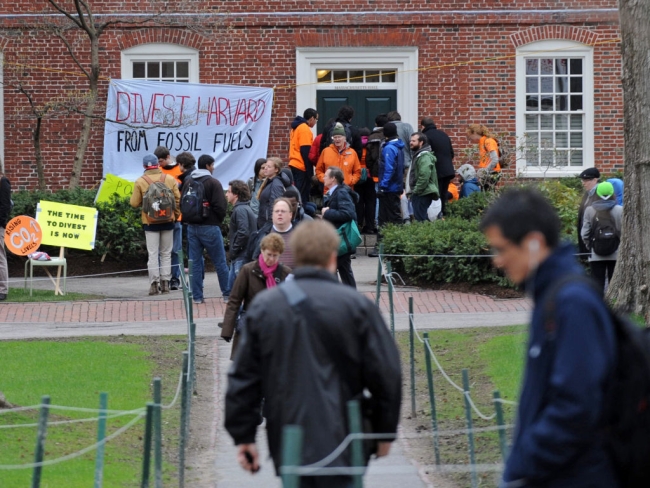You have /5 articles left.
Sign up for a free account or log in.

Protesters block the entrance to the Harvard University president’s office during a 2014 protest against fossil fuel investment.
MediaNews Group/Boston Herald via Getty Images/Contributor/Getty Images
Divestment advocates at Harvard University and beyond took a victory lap earlier this month after university president Lawrence Bacow published a message outlining Harvard’s plan to phase out its legacy fossil fuel investments.
The Harvard Management Company, which oversees the university’s $41 billion endowment, announced in February that it no longer holds direct investments in fossil fuel companies and that it does not plan to make such investments in the future. Bacow reiterated this fact in his Sept. 9 message and included another small but important detail: a number of indirect legacy investments, which make up less than 2 percent of the endowment, will end in the coming years, and the university will not renew those partnerships.
For many students and climate justice advocates, this effectively spelled out a commitment by Harvard to divest from fossil fuels. The news captured the attention of divestment activists, higher education officials and media all over the world.
“We think that Harvard’s announcement is a growing recognition that fossil fuels are a violation of fiduciary duty,” said Sofia Andrade, a Harvard student and organizer with Fossil Fuel Divest Harvard, a student-led effort pushing the university to divest from fossil fuel companies. “It will hopefully have a nationwide impact, so we definitely expect other schools to follow suit pretty soon.”
But it’s unclear if Harvard has truly, fully abandoned its ties to the fossil fuel industry. Bacow did not use the words “divest” or “divestment” in his message, describing the management company's actions as “reducing its exposure to fossil fuels.” He also did not address several lingering questions about Harvard’s endowment, namely when the legacy investments would end and whether Harvard’s money is still tied up in fossil fuels via other indirectly managed funds.
Harvard spokespeople declined to speak on the record in response to Inside Higher Ed’s questions asking for clarification about Bacow’s announcement.
John Rosenberg, editor of Harvard Magazine, explored the gray areas in Bacow’s message in an opinion piece for the independent news magazine. A recent overhaul of the company's investment strategy outsourced “nearly all” of Harvard’s investment management, Rosenberg wrote. As of June 2020, 18.9 percent of Harvard’s assets, including the endowment, were invested in public equities. Another quarter were invested in private equities, and about 36 percent were invested with hedge funds. Most of these funds remain indirectly managed.
“If Harvard has issued instructions excluding [all fossil fuel] investments outright -- in the past, or since last February -- it has not said so,” Rosenberg wrote. “Clearly, its recent investment decisions have led it to progressively deemphasize its former natural-resources strategy, and its small direct investments eschew the fossil-fuel sector -- as it has made evident since last winter. But it has not made a public announcement of any blanket prohibition.”
Divestment Advocates Call It a Success
Despite enduring questions about the finer details of Harvard’s plan, student divestment advocates have interpreted Bacow’s message as a win.
“The decision, which comes after a decade of activism by students, faculty and alumni, is a major win for the climate justice movement -- and a major blow against the fossil fuel industry,” said Connor Chung, a junior at Harvard and member of Fossil Fuel Divest Harvard.
Support for divestment has grown over the past several years, said Bill McKibben, a Harvard alum and co-founder of 350.org, an organization working to address the climate crisis.
“We’re past a tipping point,” McKibben said. “Elite institutions around the world have divested from fossil fuels.”
The list of colleges and universities that have divested or are in the process of divesting from fossil fuels is long, and includes many wealthy institutions, such as the University of Oxford, Middlebury College, Brown University, Columbia University, Georgetown University, the University of California system, the University of Cambridge, Rutgers University and American University.
Regardless of the actual language used, Harvard’s announcement has emboldened student and alumni climate activists to keep the pressure on holdout institutions to divest entirely.
“I think it’s pretty clear that Yale and Princeton have nowhere left to hide,” McKibben said.
Yale University and Princeton University are two of many institutions that have taken steps toward divestment without committing to abandoning fossil fuels entirely.
Yale outlined a set of ethical investment guidelines in April that limits which companies the university can invest in. In order to be eligible for investment by Yale, companies must avoid exploration and production of fossil fuels that “generate high levels of greenhouse gas emissions relative to energy supplied as compared with feasible alternatives” and support accurate information about climate change, among other things.
In response to a question about whether Yale would divest entirely from fossil fuels following Harvard’s announcement, spokesperson Karen Peart pointed to the new investment guidelines and a couple of other climate-focused initiatives at the university.
Meanwhile, Princeton University has pledged to “dissociate” from tar sands and thermal coal companies, as well as companies that engage in climate disinformation campaigns. For Princeton, “divestiture means dissociation,” but dissociation permits “partnerships aimed at improving a company’s conduct or standards so that dissociation is no longer necessary,” according to a May statement from the university.
A Princeton spokesperson did not respond to a follow-up question about whether the university invests in natural gas companies and if those investments would also be eligible for divestment.
Outside the Ivy League, Jesuit institutions are grappling with the same issues. Pope Francis has pushed Catholics and the Catholic Church to shift money away from fossil fuels, giving a speech last year that called for divesting from companies “that do not meet the parameters of integral ecology.”
At least one Roman Catholic university -- the University of Dayton in Ohio -- has divested entirely from fossil fuels. But Boston College, a Roman Catholic college with a $2.6 billion endowment, has repeatedly rejected student and alumni calls to divest. Spokesperson Jack Dunn said again last week that the college has no plans to divest from the industry.
“While our investments in fossil fuel companies are minimal, we are opposed to divestment on the grounds that it is not an effective means of addressing climate change,” Dunn said in an email Wednesday. “The University’s position remains that the best way to respond to the important issue of climate change is for Boston College -- along with corporations, organizations, and individuals -- to take action to reduce energy consumption and enhance sustainability measures.”
Student divestment advocates at Boston College and Harvard have similar strategies: both groups filed a complaint with the Massachusetts attorney general arguing that investment in fossil fuels violates the fiduciary duties of their institutions.
“We believe that spooked Harvard into making this announcement,” Andrade said. “In the email that President Bacow sent, he all but quoted the complaint that we filed. His argument that investing in fossil fuels was in violation of the university’s fiduciary duty, and thus that fossil fuels should be divested from, is very much in line with the arguments that we were alleging.”
The attorney general’s office is still working on the Harvard and Boston College cases, organizers from both institutions said. Kyle Rosenthal, a recent graduate of Boston College and former organizer with the student-led group Climate Justice at Boston College, said that Harvard’s announcement strengthens Boston College students’ case.
“It seems very clear that [Harvard officials] recognize the impact of the complaint, both in its arguments and the potential legal implications, and so we think that that only aids our argument further,” Rosenthal said.
You Can’t Argue With Mother Nature
Over the past decade, college and university officials have lobbed a variety of antidivestment arguments at advocates as student, alumni and employee activists have fought increasingly hard to push their institutions away from oil, gas and coal companies.
The arguments typically used to justify fossil fuel investments include: divestment is hypocritical given our continued dependence on fossil fuels, divestment is not financially prudent, divestment is not an effective way to address the climate crisis and institutions have greater influence over fossil fuel companies if they remain as shareholders.
Many institutions that have made such statements in the past have since reversed their positions -- including Harvard. In 2013, then-Harvard president Drew Faust argued that fossil fuel divestment was a financial risk and said it would be hypocritical for the university to divest considering its dependence on fossil fuels for energy, transportation and technology.
“Given our pervasive dependence on these companies for the energy to heat and light our buildings, to fuel our transportation, and to run our computers and appliances, it is hard for me to reconcile that reliance with a refusal to countenance any relationship with these companies through our investments,” Faust wrote at the time.
But campus activists have been relentless. Harvard and Yale students stormed the football field during halftime of the Harvard-Yale football game in 2019 to call for fossil fuel divestment. Harvard faculty members voted 179 to 20 in favor of divestment in February 2020. And Harvard alumni elected three pro-divestment members to the Harvard Board of Overseers in August of last year.
Each year a new class of students moves onto the Harvard campus, and each class is more concerned about climate change than the last, McKibben said.
“Harvard finally decided, I think, that the pain of divesting -- which in their case is worry that some ancient, old alumni will get mad at them and not give them another squash court -- was outweighed by the pain of not divesting,” he said. “What do you say to a group of people who’ve grown up listening to Greta Thunberg?”
As divestment fights continue on college campuses all over the world, one force has not slowed since activists first took up the issue decades ago: climate change.
Many American colleges and universities have already experienced climate change-related destruction. Each summer, dozens of colleges in California are forced to evacuate or endure poor air quality as wildfires rage across the state. Campuses across the Midwest stand in the path of violent storms, flooding and tornadoes, which in recent years wreaked havoc at Jacksonville State University and William Carey University. Still others are repeatedly battered by hurricanes, which have increased in frequency and intensity since the 1980s.
Some colleges have been blindsided by disastrous weather that was previously unheard-of in their regions, such as the deep freeze that swept the South in February and damaged campus infrastructure at many institutions.
The growing litany of climate disasters will eventually force every institution to divest, McKibben argued. As he put it: “Mother Nature is a good organizer, too."




